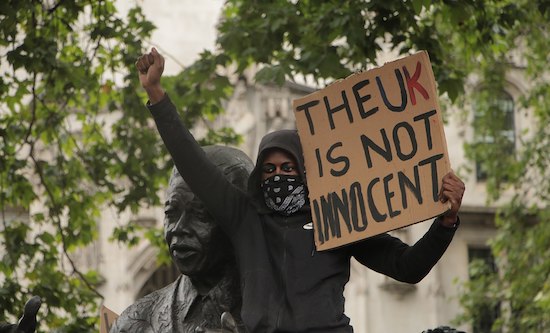
The November 2020 publication of Britain Is Not Innocent, a report by the Network for Police Monitoring (Netpol), is a timely demonstration of how the police have used coronavirus rules to attack and criminalise Black Lives Matter (BLM) and other anti-racist protests, and a warning that they will continue to do so in the future. The report places the policing of the summer demonstrations in the context of a long history of police racism, ridiculing Metropolitan Police Chief Constable Cressida Dick’s claim that ‘I don’t think [the police are] collectively failing. I don’t think [racism] is a massive systemic issue. I don’t think it’s institutionalised.’ (cited p6)
Following the US police murder of George Floyd on 25 May 2020, numerous BLM protests took place throughout towns and cities across Britain, with some places holding their first ever anti-racist actions. Many took place under the slogan ‘The UK is not innocent’, showing not just solidarity with victims of the murderous US police, but making it clear that British police were no different, and openly challenging the British state. The report describes the sweeping new powers that police were awarded under the 2020 Coronavirus Act and subsequent regulations. This allowed them to give fines to people that they interpreted as violating the rules and this often included protests. The Netpol report found that by July, black and Asian men were much more likely to be fined by police using lockdown powers. The police also have the power to detain anyone they suspected of being infectious.
Police also used the extended Section 60 (Criminal Justice and Public Order Act 1994), a law that enabled stop and searches to occur without any reason for suspicion. According to the report, 65 such orders were imposed in London alone. Black people are 10 times more likely to be stopped and searched than white people, and this increased to 43 times with Section 60 orders. Stop and searches increased by over 40% between April and June, with nearly 20,000 black people facing searches in London alone. This was the equivalent of 25% of black men aged 15-24 in the capital (p15).
The largest BLM protests took place in London, and were aggressively policed by the Met Police, using pepper spray, baton charges and horses. In one incident, a young black woman was knocked unconscious by a riderless horse. The Met released a statement on the injuries to the officer who had fallen off, and the horse, but not mentioning the young woman, claiming they had not received a complaint.
There was also the use of ‘kettling’, with police cornering protesters for up to eight hours, making social distancing impossible, with no access to food, water or toilets. One such kettle on 7 June lasted until 2am, despite many of the people detained being minors, and police released them only after illegally collecting personal details. Legal observers who attended the events reported they were also attacked; one said that an officer had threatened to arrest him if he didn’t show proof that he was a solicitor. The report details incidents where black and Asian people were assaulted by racists even when they were not part of any demonstration, with the police refusing to take action against the perpetrators.
While much of the report focuses on London, there is also coverage of the way Northumbria Police have attempted to suppress anti-racist protests in Newcastle, including those called by Newcastle Fight Racism! Fight Imperialism!, one officer saying: ‘We won’t allow any Black Lives Matter marches into the West End [of Newcastle] – not today, not next week, not ever’ (p27). But Northumbria Police allowed far right racists to demonstrate, throwing bottles, cans of beer and fireworks, and then used the disorder created by these fascists as an excuse to ban BLM and FRFI actions.
The Tory government is determined to suppress or restrict political protest. That much is evident from the coronavirus regulations issued at the start of November, in which the previous protest exemption had been removed from a list of forbidden public activities. Home Secretary Priti Patel would clearly like to ban any kind of political protest or demonstration, despite this contravening the Human Rights Act. The Netpol report is a reminder that we only have the human rights and civil liberties that we are prepared to fight for.
Lehtu Mpetha
The report is available free of charge at https://netpol.org/black-lives-matter




